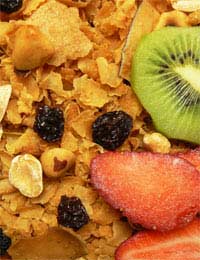Why is Breakfast Important?

Breakfast is important, but it seems to be the meal that is most often overlooked. In a survey published in 2000, 5% of children aged 10-11 years (year 6) had no breakfast that day, 3% only had a drink, and 9-13% had crisps or chocolate. In the same survey, 21% of 15-16 year old girls (year 10) had no breakfast that day and 19% had only a drink.
So… Why Eat Breakfast?
Why is breakfast the most important meal of the day? Because it helps with children’s behaviour, health, schoolwork and weight control.Breakfast and Behaviour
Children who don’t have breakfast tend to get tired and irritable by mid to late morning, and more likely to get bad-tempered and behave badly.Breakfast and Health
Children who eat breakfast are more likely to have a balanced diet, getting all the vitamins and minerals they need.Breakfast and School
In a number of studies of breakfast and schoolchildren, children who have breakfast tend to have better scores on tests and their attendance at school is better as well. Their hand-eye co-ordination, alertness and creativity can also be better, too.Breakfast and Weight Gain
Many young people skip breakfast thinking that it will help them lose weight – in fact, eating a healthy breakfast is actually more helpful in losing or maintaining weight. Children who have a good breakfast are less likely to snack during the morning. Studies link skipping breakfast with obesity, and overweight or obese children are more likely to become overweight or obese adults.Getting Children to Eat Breakfast
Some children just don’t want to eat breakfast. Getting them to plan breakfast menus, choose breakfast foods and prepare their own breakfast gets them more involved. Setting a good example also helps – if parents or carers eat breakfast, children are more likely to as well, and breakfast is important for adults for all the same reasons that it’s important for children.If it’s difficult to get children to eat breakfast, or it’s just not possible to fit breakfast into the morning schedule, some schools have breakfast clubs, where children can eat a healthy breakfast with their friends, and play games or get some exercise too.
What Makes A Healthy Breakfast?
Wholegrain bread, rolls or crispbreads topped with cheese, cottage cheese, peanut butter, baked beans or poached or scrambled eggs provide both slow release energy and protein.Cereals, especially those containing whole grains and extra vitamins, but that are low in salt and sugar, are a good start to the day, providing a slow release of energy that should last all morning, and are quick and easy to prepare. Children under two should only have full-fat milk, when they can switch to semi-skimmed. Children should not have skimmed milk until they are five years old. Adding in fresh, frozen (lovely in summer) tinned or cooked fruit helps with ‘five a day’.
Fruit juices and fruit smoothies are good too, but drinking too much with or before a meal can fill children up too quickly, and too much fruit juice can damage growing teeth.
Breakfasts on the go include cereal bars but watch out for sugar, salt and fat levels, fruit juices, milkshakes and smoothies in cartons, bananas, and packs of seeds, unsalted nuts and dried fruit.
- Are Nuts Healthy?
- Healthy Eating to Avoid Diabetes
- Eating for Healthy Bones
- Why It's Good to Eat as a Family
- Drinking Water: Why and How Much?
- The Correct Food Portion Sizes for Kids
- Milk Intolerance in Children
- When Your Child is Diagnosed With a Failure To Thrive
- From Breast to Bottle
- When and How to Wean Your Baby
- Bottle Feeding Your Baby
- Breast Feeding Your Baby

Re: Superfoods on a Budget
I just checked out these fantastic tips for buying superfoods on a budget! Eating healthy doesn’t have to be expensive. Can’t wait to try…
Re: Fun Facts: How Many Calories Does a Child Burn?
hi, im eleven yrs. I weigh about 100 lbs and believe I am over the normal weight. I am about 4’10 ft. I…
Re: Fun Facts: How Many Calories Does a Child Burn?
I want to clear this up for everybody worried about their weight, especially at a young age you shouldn’t…
Re: Dealing with a Child that is Always Hungry
I am the great grandmother of an 8 year old that I mostly take care of her mom is around but she totally depends…
Re: Fun Facts: How Many Calories Does a Child Burn?
I’m 11 years old and recently got a smart watch. This isn’t a big question but I can’t find how many…
Re: Dealing with a Child that is Always Hungry
I'm immediately suspicious of an article that suggests cereal as a healthy snack. Cereal (especially cereal…
Re: Fun Facts: How Many Calories Does a Child Burn?
How many calories SHOULD an average twelve year old burn daily???
Re: Fun Facts: How Many Calories Does a Child Burn?
I'm 9 years old and I'm trying to set up a health journal but I don't know how many calories I should…
Re: Fun Facts: How Many Calories Does a Child Burn?
Hiw much calories should an average 10 year old burn a day?
Re: Dealing with a Child that is Always Hungry
I’m 16 and my sister is 11 years old 57 inches and weighs 90 pounds she only drinks like 2 or 3 16 ounce bottles…